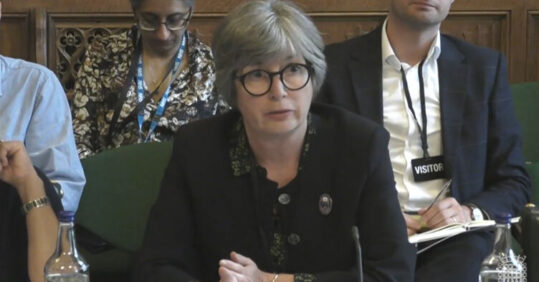NHS workforce plan lacks ‘granular detail’ RCN tells MPs

The NHS Long Term Workforce plan lacks ‘any detail’ around how its ambitions will be delivered, the Royal College of Nursing’s (RCN) director for England has told an influential committee of MPs.
Speaking during a Health and Social Care meeting on Wednesday, Patricia Marquis also raised concerns over how new students would be attracted into the profession and whether the NHS had capacity to train them, following commitments made in the workforce plan to significantly increase nurse training places.
Ms Marquis said the workforce plan – which was published last month after a series of delays – was ‘a nice lofty set of aspirations without any detail of how they’ll be delivered’.
‘What we’ve got is a plan that’s trying to solve a retention crisis with recruitment, and that’s not really the way to do it.
‘I don’t think there’s granular detail, I think that’s what’s absent. A plan is absent,’ added Ms Marquis.
Related Article: New preceptorship package for social care nurses
These comments come in response to the NHS Long Term Workforce Plan’s target of increasing the number of nurse training places by 80% by 2031.
Under the plan, the number of training places for district nurses will grow by 41% in the next five years (2028/29). It said this supported an ‘ambition’ to increase places by 150% – to nearly 1,800 a year – by 2031/32.
However, Ms Marquis asked during the meeting: ‘What in the plan is there to turn around the lack of applications to the programmes in the first place, because we can’t recruit the number of places?
‘We can’t fill the places we’ve got now and there’s no evidence to demonstrate how we then intend to double that. So, that would be where we say retention is critical.’
Today, new Universities and Colleges Admissions Service (UCAS) data showed that applications to study nursing in the UK were down 16% in a year, and down by 22% since 2021 when applications were higher following the Covid-19 pandemic.
In addition, Ms Marquis stressed the importance of investment in nursing education, raising concerns that a shortage of trainers and mentors in practice may hinder efforts to boost recruitment.
‘A big issue for us is placements and actually supporting people in placement. We’ve got a shortage of educators, those in the university sector providing education, and mentors and supervisors in practice,’ she told the committee.
‘We’ve got a workforce that’s depleting who we need to be there to support those new students.’
Related Article: Applications to study nursing in England at ‘new low’
Another aspect of the long term workforce plan questioned by Ms Marquis was the commitment to increase the number of nurses trained through apprenticeship routes.
The NHS Long Term Workforce Plan aims to increase the number of nurses qualifying through apprenticeships from 9% to 20% by 2028/29.
Ms Marquis told the committee that while the RCN ‘welcomed’ the apprenticeship route into nursing, the union still ‘fear a two-tier approach’ – where students who can afford tuition fees receive university training, while students who cannot afford tuition are forced to take the apprenticeship route.
Ms Marquis said that the union had reservations about any system ‘that forces a section of society down only one route where another section has opportunities to access higher education in the traditional way’.
‘What we would seek is funding to enable everybody to have the same choice to do a university route or an apprenticeship route.’
Related Article: Paul Rees appointed as permanent NMC chief executive and registrar
Likewise, Dr Adam Kay, former doctor and author of This is Going to Hurt, told the committee that the apprenticeship route ‘feels unworkable’ because ‘a proportion of students are being paid to train and yet the remainder are paying to train’.
In addition to Dr Kay and Ms Marquis, the committee also heard evidence from Charlie Massey, chief executive and registrar at the General Medical Council, Professor Kamila Hawthorne, chair of Royal College of General Practitioners (RCGP) Council and Alex Whitfield, chief executive at Hampshire Hospitals NHS Foundation Trust.
NHS England has been contacted for comment while the Department of Health and Social Care declined the opportunity to comment.

See how our symptom tool can help you make better sense of patient presentations
Click here to search a symptom




